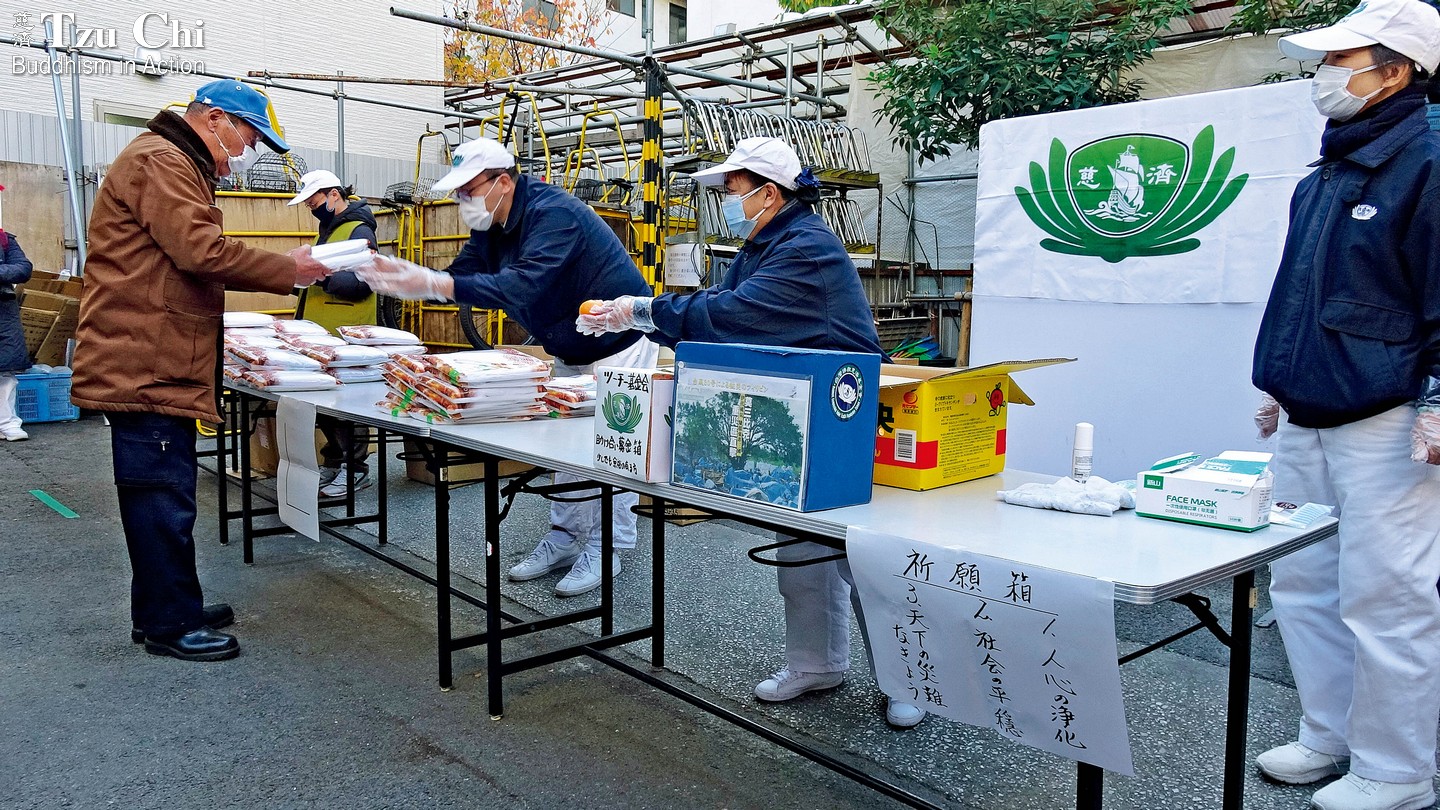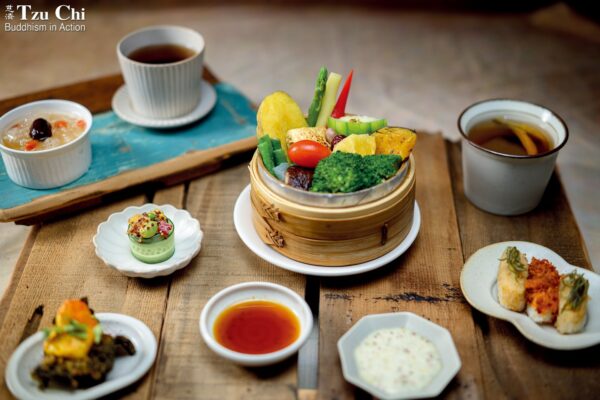By Chen Jing-hui
Edited and translated by Tang Yau-yang
Photos by Sun Su-qiu
Nishinari, in Osaka, Japan, once prospered as a hub for day laborers, but it became a gathering place for the homeless after the economic bubble in Japan burst. The restrictive measures that the government took to combat the COVID-19 pandemic increased unemployment and heightened the plight of the underprivileged.
The COVID-19 virus spread so fast in Japan in early 2021 that confirmed infections reached record highs. The situation was so severe the Japan Medical Association warned that medical care in Osaka Prefecture was teetering on the brink of collapse. On January 9, 2021, the Japanese government declared its second state of emergency in response to the pandemic. By early February, diagnosed cases in the country had exceeded 400,000.
The coronavirus has done more than cause sickness and death—it’s also taken a toll on the economy. NHK, Japan’s only public broadcasting system, quoted the Ministry of Health, Labor and Welfare as saying that the raging pandemic had led to the layoffs of nearly 80,000 people in Japan by the end of 2020. This was a hard blow for a country that has for the last several decades witnessed a steep climb in the number of people relying on part-time or temporary work. Now, with the addition of the newly unemployed, the government has an urgent and thorny issue on its hands: how to prevent these vulnerable people from becoming homeless.
Street people and day laborers in Osaka are mostly concentrated in the Nishinari district. The job market for day laborers in Nishinari began soaring with the boom of the Japanese economy in the 1960s. However, when the economic bubble in Japan burst in the 1980s, the district became a hub for the homeless. Though work isn’t as abundant as it used to be, the local day labor industry has continued to give the unemployed a glimmer of hope and a link to potential work. It’s a tenuous lifeline, one without which many people would certainly face homelessness.
The Airin Nighttime Shelter in Nishinari provides free, short-term accommodation for street people and day laborers. (The shelter was set up by the Osaka city government, but its management is outsourced.) After COVID-19 broke out, the shelter implemented strict virus prevention measures. Such steps included reducing the number of people it accepts from 500 to about 300; changing from assigning beds on a first-come-first-served basis to a fixed assignment system; installing partition curtains around each bed; and providing temperature checks and hand sanitizer at its entrance.

Tzu Chi volunteers, accompanied by staffers from the Airin Nighttime Shelter in Nishinari, Osaka, distribute curry rice to the homeless after a hot food distribution at the shelter in June 2020.
Love in the midst of pandemic precautions
COVID-19 infections in Japan kept hitting record highs after the start of winter in late 2020. In response, the Osaka Prefecture government declared a red-light state of emergency on December 3. The government urged residents to refrain from non-essential outings or traveling across prefecture lines. Announcements were posted at all transportation stations, calling on everyone to wear a mask, be alert, and avoid close contact.
Tzu Chi volunteers kept a close eye on the number of confirmed infections that the government announced every day. They also kept in close touch with Hidetoshi Yamanaka, manager of the Airin Nighttime Shelter, to discuss the annual winter distribution to be held there on December 6. This would be the fifth winter distribution Tzu Chi volunteers had held at the nighttime shelter.
Volunteers debated whether to go ahead with the distribution as scheduled for December 6, given that the infections were increasing. They considered postponing it until mid-December. But then they thought: if they postponed the distribution, would the pandemic be more stable and manageable by that time? They also knew another cold front was approaching, and now was the time that vulnerable people most badly needed winter clothing. In the end, they decided to go ahead as scheduled, despite all the uncertainties. Love couldn’t wait.
Two hundred and fifty sets of thermal undergarments, socks, and towels were delivered to the Airin shelter on the day of distribution. Shelter manager Yamanaka said that the laborers were looking forward to the distribution. They were grateful to Tzu Chi volunteers for not postponing the event.
Shogo Nakamura, a Japanese Tzu Chi volunteer, instructed two young, first-time volunteers how to conduct themselves during the Tzu Chi event. He taught them to bow at 90 degrees and use both hands to present supplies to each recipient. Jiang Yi-cheng (江佾澄), one of the first-time volunteers, was in Japan for a working holiday. Because his parents are Tzu Chi recycling volunteers, he sought out Tzu Chi in Japan and expressed his desire to volunteer. “Helping others is creating blessings for yourself,” he said. He appreciated that he could help others during this event.
The other young man, Zhuo Zhang-wen (卓樟汶), had come to Japan to work. He said that he had never understood why Tzu Chi conducted its distributions in such a formal way. Now that he had seen firsthand those formalities in action, he could feel the power of the 90-degree bows, which allowed the warmth of the volunteers to go straight to the recipients.
Distribution goods were placed on long tables in the open space outdoors. The event was staffed by only five volunteers, which included the two young men, Jiang Yi-cheng and Zhuo Zhang-wen. Interestingly, their presence brought a spring to the steps of the other, older volunteers. Shelter staffers controlled the number of people and enforced safe distances inside the shelter. Tzu Chi volunteer Yu Qiong-zhu (余瓊珠) smiled and said, “Day laborers come one after another, but proper spacing keeps the virus from spreading.”
Yamanaka appreciated Tzu Chi’s continued support for the day laborers, so he once again made a donation box into which recipients could drop their pocket change. “We can give back only this little bit,” he said. “Even so, I still hope that this helps.”
Having known Tzu Chi for years now, most day laborers donated their spare change after they had received their share of the distributed goods. Masuo Akiniwa, 77, wished for a harmonious society after making his donation. The pandemic regulations prohibited anyone over 70 years of age from living in a shelter, so he had been forced to live outside for six months now. “I work part-time jobs such as cleaning, but still I don’t have enough to eat. I’m too old; getting a job is difficult for me. Thank you so much for your help!” he said.

Volunteers distribute warm underclothing to day laborers at the Airin Nighttime Shelter. This was their fifth winter distribution. The warm clothing was much appreciated in the cold of December.
Warming their stomachs
Work became even scarcer during the pandemic, making it more difficult for many people to support themselves. The Osaka Prefecture government made its first emergency declaration over COVID-19 on April 7, 2020. Many charity groups, including Tzu Chi, suspended their soup kitchens or hot food distributions as a result, greatly disrupting the food supply to day laborers and street people. Volunteer Yu Qiong-zhu often talked on the phone during this time with Yamanaka to convey Tzu Chi’s care. Between March and May 2020, when it was difficult to procure face masks, Tzu Chi still managed to send masks, disinfectant alcohol, sanitizer, and rice balls to Airin.
On June 1, 2020, after learning that the state of emergency had been lifted, volunteers contacted Yamanaka about resuming Tzu Chi’s monthly hot food distributions. Although it was just a meal a month, the volunteers wanted to convey their love.
Even though the state of emergency had been lifted, the epidemic was not yet under control. Everyone knew they needed to stay vigilant and avoid getting too close physically. Yamanaka recommended that boxed meals be served at the distribution to avoid a prolonged, crowded gathering. The night before the June 14 event, volunteers Keiko Manabe and Yu Qiong-zhu transported the ingredients for a 220-person meal to their own homes where they washed, cut, and readied them for cooking. The next day, they took the ingredients to Airin to cook. Volunteer Chen Mei-yue (陳美月), who lived nearby, rode a bicycle to join the effort at about 1:30 in the afternoon. A total of six Tzu Chi people served at the event.
Yamanaka had anticipated that not as many volunteers as before would show up for the event, so he had invited ten shelter staffers to help with the cooking. Airin had been very busy these months. “During all these months, we only served hot food to the laborers once,” Yamanaka said. “Despite the pandemic, you came here to cook hot food for them. I’m very thankful.”
As the pandemic rates went up and down that summer, the restrictions made it hard to even offer a hot meal. Volunteers had to switch from giving out hot food to rice balls at their July event. The Dragon Boat Festival had just passed, so volunteers also made 200 vegetarian zongzis, a traditional Chinese food served wrapped in bamboo leaves, typically eaten during the Dragon Boat Festival. Volunteers gave out the zongzis along with the rice balls.
Yamanaka had collaborated with many groups to provide lodging and work for people in the Osaka area who had become homeless after the pandemic broke out. “This group of people is often the first to be forgotten by society,” he said, “but all lives are equal. I have to work harder to continue to help them.”
After each distribution at the Airin shelter, volunteers walked the neighborhoods nearby to search for street people who had missed the distribution. If the homeless could not come to them, they tried to reach out and take the supplies to them. The volunteers hoped to deliver some warmth and their best wishes to those who slept out in the streets. Since the world is still in the grip of the pandemic, the volunteers will stay vigilant and continue to give out their love.



